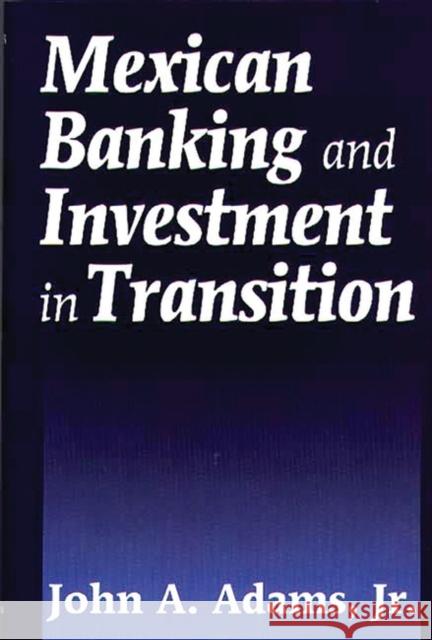Mexican Banking and Investment in Transition » książka
Mexican Banking and Investment in Transition
ISBN-13: 9781567200546 / Angielski / Twarda / 1997 / 272 str.
Banking and investment in Mexico have changed radically over the past decade, and the economic events that prompted these changes will have a significant impact on Mexico's role in regional and world financial markets. Adams traces the evolution of Mexico's banking and investment activities, reviews current conditions and their implications for future investment opportunities in Mexico, and makes clear that what happens to Mexico's economy and political stability will have major implications for what happens elsewhere in the world. One of the first books to look at banking and investment in Mexico after the peso crash of 1994-1995, with a highly detailed bibliography and notes, Adams's study will be important reading for international business, finance, and investment professionals and for their colleagues with similar interests throughout the academic community.
The fate of both Mexico and the United States is that the two countries are forever tied by geography. The historical evolution of the dual interaction between the peoples of these two nations is and will be significant for the future of both countries. With this in mind, the book is divided into chapters reviewing such themes as the interaction and historical financial events that transpired during the advent of the North American Free Trade Agreement (NAFTA) and the expansion of cross-border financial and investment services, as well as a framework and background review of the events leading up to and resulting from the devaluations of the 1970s and 1980s, and more recently the evolution of the peso crisis of 1994-1995. The imperceptible yet gradual economic integration of the two economies has required time in developing, while not always being seamless in its implementation and transition. American macroeconomic policy has long had a direct impact on the economy of Mexico, as is evidenced by the impact of U.S. interest rates on the financial underpinnings of the Mexican treasury and the banking system to assist with the overall economic growth of the nation. An appreciation for the historically sensitive issues and perspectives, be they nationalization of the oil industry, immigration, or market access for foreign financial services, is paramount to a fuller understanding of doing business on both sides of the border.











